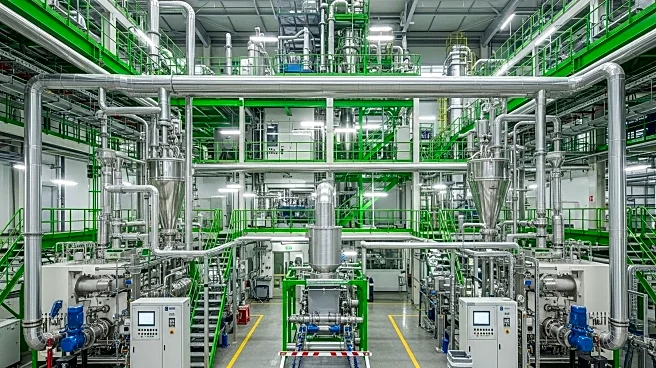What is the story about?
What's Happening?
Vioneo, a European manufacturer specializing in fossil-free plastics, has partnered with ECI Group to construct the world's first low-density polyethylene (LDPE) plant using entirely fossil-free feedstock. The facility, located in Antwerp, Belgium, will utilize ECI Group's proprietary autoclave technology to produce 110,000 tons of LDPE annually from certified green methanol. This initiative is supported by A.P. Moller and Repsol, which will provide market knowledge and product expertise. The project marks a significant step towards sustainable plastics production, aiming to reduce lifecycle emissions and deliver high-performance LDPE for various industries.
Why It's Important?
The development of a fossil-free LDPE plant represents a major advancement in the transition to sustainable plastics, addressing environmental challenges associated with conventional manufacturing processes. By using green methanol derived from biogenic CO₂, the plant will significantly lower emissions, contributing to global efforts to combat climate change. This initiative positions Europe as a leader in the defossilization of the €5 trillion chemicals and materials sector, potentially influencing global industry standards and encouraging further investment in sustainable technologies.
What's Next?
The construction of the LDPE plant is expected to set a precedent for future fossil-free manufacturing facilities. As the project progresses, stakeholders will likely monitor its impact on the plastics industry and assess its scalability for broader application. The collaboration between Vioneo and ECI Group may inspire similar partnerships, driving innovation and sustainability in polymer production. Additionally, the success of this venture could prompt regulatory bodies to support and incentivize fossil-free initiatives, further accelerating the shift towards environmentally friendly practices.
Beyond the Headlines
The establishment of a fossil-free LDPE plant may have long-term implications for the global plastics industry, potentially reshaping supply chains and influencing consumer preferences towards sustainable products. Ethical considerations regarding environmental responsibility and corporate sustainability could become more prominent, encouraging companies to adopt greener practices. This development may also lead to increased research and investment in alternative feedstocks and technologies, fostering a culture of innovation and environmental stewardship.

















